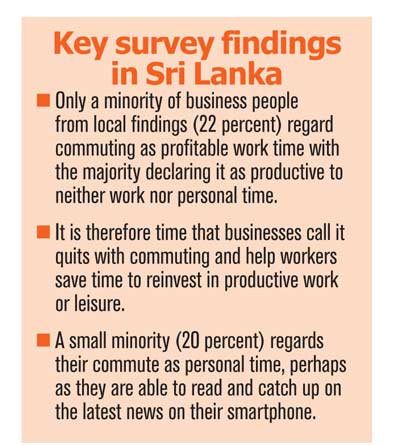Reply To:
Name - Reply Comment
 People hang on to a crowded train in peak time (Reuters photo)
People hang on to a crowded train in peak time (Reuters photo)
The latest research from flexible workspace provider Regus shows that business people globally regard their daily trip into and out of the office as a drain on productivity.
This ‘limbo’ of time that is mainly seen as neither productive work time, nor enjoyable personal time is widely regarded as an obstacle to more useful or entertaining pursuits.
 Of the almost 40,000 Regus survey respondents from around the world including Sri Lanka, 37 percent reported commuting is pointless, undefined time, while 27 percent positively hate their commute and brand it as a ‘waste’ of their precious time.
Of the almost 40,000 Regus survey respondents from around the world including Sri Lanka, 37 percent reported commuting is pointless, undefined time, while 27 percent positively hate their commute and brand it as a ‘waste’ of their precious time.
This means that for well over half of business people globally commute time could be reinvested in more productive work time or in enjoying a few hours more sleep in the morning.
Ninety six percent of local respondents had disclosed that if they were to choose from two similar jobs, they would have gone for the job that offered flexible work time.
A majority of business people (69 percent) also agreed that flexible workers are more rested as a result of working closer to home. Regus Sri Lanka Country Head Dr. Nirmal De Silva commented, “As commute times continue to get longer and longer, it is interesting to find that the vast majority of workers regard their daily travel to work and back home as a complete drain on their workday productivity and that they are equally unable to devote it to personal or leisure activities. This indeed will pose many challenges for employers and therefore, need to keep this in mind in their continuous pursuit of attracting and retaining talent.

Business people globally are expected to always be available and connected, but in reality there is a much bigger and subtler drain on their productivity than not having a smartphone on hand and that is the daily commute.
Savvy businesses wanting to restore productivity and reward workers with more personal time or simply with a lie-in every once in a while, would do well to allow employees to work closer to home at least some of the time.”